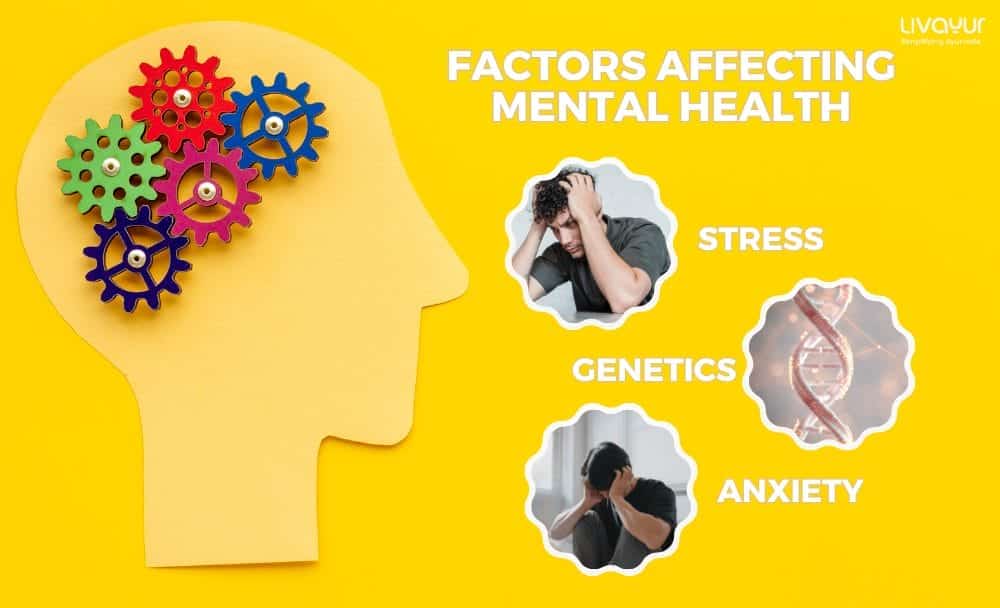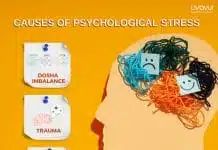
Mental health makes a vital aspect of overall health and well-being and can be described in at least three manners: first, as the lack of illness; second, as a condition of the organism that enables the complete execution of all its functions; and third, as a state of equilibrium within oneself and between oneself and both the physical and social surroundings. [1]
It is characterized by an individual’s self-perception and emotional experiences, influencing their resilience and adaptability during challenging times. Mental well-being is regarded as pivotal in determining an individual’s capacity to function effectively, capitalize on available opportunities, and engage fully with their familial, professional, communal, and peer contexts. [1]
While mental health can be influenced by a variety of factors, experts have identified several key elements that play a significant role in shaping mental well-being. These factors, ranging from genetic predispositions to environmental conditions, highlight the intricate interplay between biology, psychology, and society. In this article, we delve into 10 crucial factors affecting mental health.
Top factors affecting mental health
- Loneliness

Loneliness is characterized as an uncomfortable and perturbing feeling stemming from the perceived disparity between one’s desired and achieved social relationships. [2]
- Stress
Stress is a psychophysical adaptive response triggered by perceived stressors. It represents a psychological strain or tension stemming from demanding or unfavorable circumstances. [2]
- Anxiety
One of the primary factors affecting mental health of students is anxiety which denotes a mental state characterized by feelings of insecurity, threat, and discomfort in response to perceived stimuli. It is also associated with apprehension toward the unknown or impending outcomes. [2]
- Depression

Depression is characterized by feelings of hopelessness, isolation, low self-esteem, and self-criticism. Symptoms include fluctuating connections with the environment, social detachment, and vegetative states such as loss of appetite and insomnia. [2]
- Genetics and Family History
Genetic factors contribute to a predisposition for certain chronic medical and psychiatric diseases. A family history of disorders like depression, anxiety, bipolar disorder, or schizophrenia can increase the likelihood of these conditions occurring in subsequent generations. [3]
6. Physical Health and Lifestyle:
Physical health and mental health are interrelated. Regular exercise, a balanced diet, adequate sleep, and avoidance of substance abuse are critical for maintaining mental well-being and precluding the possibility of neurological diseases like Alzheimer’s disease. Physical illnesses, chronic pain, and hormonal imbalances can impact mood and cognitive function. [3]
- Past Experiences
Early childhood or past experiences significantly shape mental health in later life. Traumatic experiences, the burden of household chores, inadequate education, and self-stigmatization can increase the risk of mental health issues. [5]
- Environmental Stressors:
External factors, such as disadvantaged social standings or discriminatory practices, are characterized by actions that aim to marginalize or treat people unequally based on their race, ethnicity, gender, and socioeconomic status. Discrimination, serving as one of the factors affecting mental health and a contributor to stress, has been associated with various psychological symptoms. [4]
- Cultural and Societal Influences:
Cultural norms, societal expectations, and stigmatization surrounding mental health influence how individuals perceive and seek help for psychological issues. Social factors affecting mental health may include traditional beliefs and practices, the effect of traditional healers, neglect, and discrimination. [5]
- Inadequate Access to Mental Health Services:
Access to quality remedial services and resources for mental health is among the fundamental factors affecting mental health. Disparities in mental health care availability, inadequate knowledge and skills of providers, lack of mental health workforce, and distance from facilities can hinder individuals from receiving the support they need. [5]
FAQs
• What are the biological factors affecting mental health?
Neurochemical imbalances, neurotransmitter activity, and brain structure play critical roles in mental health. Conditions like depression and anxiety can lead to imbalances in neurotransmitters or brain chemicals such as serotonin, dopamine, and norepinephrine. Hormonal changes, such as those occurring at puberty, pregnancy, and menopause, can also be important factors affecting mental health.
• Why are strong social support networks crucial factors affecting mental health?
Strong social connections and support systems have a protective effect on mental health. Having meaningful relationships, a sense of belonging, and a network of friends and family can contribute to resilience in the face of challenges.
• How are trauma and adversity long-term factors affecting mental health?
Traumatic events, such as accidents, violence, abuse, or natural disasters, can lead to conditions like post-traumatic stress disorder (PTSD) and complex trauma. Coping with trauma often requires specialized therapeutic interventions.
• How does Ayurveda propose to manage mental health issues?
According to Ayurveda, Manas (Mind) is a three-dimensional aspect in terms of the gunas like sattva(state of absolute purity and balance of the mind), rajas(stands for dynamism and activity of the mind), and tamas (stands for darkness and inertia). To treat mental diseases, Ayurveda recommends the use of the following three therapies:
Daiva Vyapashraya: This spiritual therapy focuses on using the power of japa, mantra, and other religious practices like wearing precious gemstones.
Satvavajaya: This psycho-behavioral therapy recommends the use of assurance (ashvasana) to replace turbulent or negative emotions and psycho-shock.
Yukti vyapashraya chikitsa: This biological therapy consists of samshodhan (cleansing or Panchakarma) and Shaman (pacification). Samshodhan is bio-cleansing of the various channels of your body, while Shaman is a palliative method of treatment using lifestyle changes, Ayurvedic drugs, and changes in food habits. [6]
Ayurvedic formulations containing powerful herbs like Ashwagandha, Brahmi and Bhringaraja are often used to treat mental ailments. Zanducare,com brings for you potent Ashwagandha capsules and Brahmi capsules for a stable mental health. Order without delay!
Conclusion
Mental health is a complex interplay of various factors that span biological, psychological, social, and environmental realms. While these 10 factors affecting mental health provide insight into the multifaceted nature of mental well-being, it is important to recognize that each individual’s experience is unique.
Disclaimer:
This article is written from a health and wellness perspective only and is not a piece of medical advice. Kindly seek the help of a certified medical practitioner before initiating any treatment.
References:
- What is mental health?
- Factors affecting the mental health of international students in Malaysia during COVID19 Pandemic: Evidences from Universiti Utara Malaysia
- Lifestyle Factors and Mental Health
- 10 Elements of Mental Health-positive and negative
- Thematic Analysis-factors affecting mental health service utilization
- ROLE OF AYURVEDA IN MENTAL HEALTH





















After study a few of the weblog posts in your web site now, and I actually like your way of blogging. I bookmarked it to my bookmark web site listing and might be checking back soon. Pls take a look at my website as well and let me know what you think.
Thanks for the sensible critique. Me & my neighbor were just preparing to do some research about this. We got a grab a book from our area library but I think I learned more clear from this post. I’m very glad to see such fantastic info being shared freely out there.
This actually answered my drawback, thanks!
You made some nice points there. I looked on the internet for the subject and found most guys will consent with your site.
Precisely what I was searching for, thanks for putting up.
Would love to forever get updated great weblog! .
Keep functioning ,impressive job!
Once I initially commented I clicked the -Notify me when new feedback are added- checkbox and now each time a remark is added I get four emails with the identical comment. Is there any way you possibly can take away me from that service? Thanks!
Absolutely written subject matter, regards for selective information.
The root of your writing while sounding agreeable at first, did not really sit properly with me after some time. Someplace within the sentences you actually were able to make me a believer but only for a very short while. I still have a problem with your jumps in logic and one would do nicely to fill in those gaps. In the event that you actually can accomplish that, I could surely end up being fascinated.